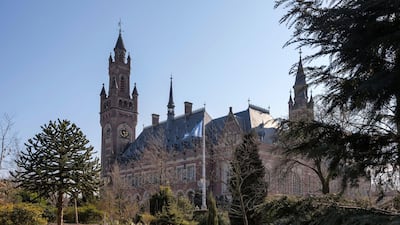The UAE accused Qatar on Tuesday of "cheap tricks" and duplicity as three days of hearings at the International Court of Justice began into Doha’s manoeuvring against its neighbours.
The UN court heard detailed legal arguments on Doha's abuse of international legal procedures in a campaign designed to undermine the boycott of the country by the Arab coalition.
The UAE legal team called on the court to preserve procedural fairness to end the disruption caused by Qatar’s tactics.
“Ultimately procedure draws on sequencing,” the bench was told. “Qatar jumped the line on the prescribed process.”
The long-running case has come to a head after months of legal exchanges.
Qatar issued a legal action in June last year after it claimed that the UAE had imposed laws or orders to prevent its citizens travelling to the UAE.
In fact, no laws or regulations have been introduced to expel Qatari citizens since diplomatic and transport ties were cut on June 5, 2017.
The Qatari complaints to international bodies claimed that the UAE was discriminating against its citizens on racial grounds and that people who had residential or other travel requirements between the two states were being disadvantaged.
The UAE denies all of Qatar's claims.
In submissions, the UAE has demanded that Doha unblock a website that allows Qataris to apply for entry permits.
The submission contains detailed argument that Qatar’s complaints lodged with the Committee for the Elimination of Racial Discrimination, or Cerd, in Geneva should be struck down as a result of the state’s failure to follow a sequential framework in its actions.
Qatar is being boycotted by its neighbours over its institutionalised support for extremists and terror organisations and its use of media organisations to promote violence and attack other GCC states.
The UAE told the court that Qatar was under an obligation to immediately stop misusing its national authorities and media outlets to spread lies and disinformation about the UAE and other neighbours.
"Qatar is employing cheap tricks to put international forums in a fix,” said Abdullah Al Naqbi, director of international law at the UAE Ministry of Foreign Affairs and International Co-operation.
“It should first stop its harmful policies against its just neighbours. It should stop funding and promoting terrorism and instead honour its commitment to the Riyadh Agreement.”
The UAE produced slides to show that Qatar sent a final ultimatum less than two months after it first contacted Cerd on March 8, 2018. That set a two-week deadline but the UAE was not formally notified until May 7.
The Emirates asked the court to direct Cerd not to accept the Qatari complaint filed on March 8 last year on the grounds that Doha simultaneously lodged a similar complaint with the court.
The subsequent international court ruling on July 23 was delivered before the deadline for the UAE’s response to Cerd, on August 7.
In effect, the UAE was not given time to compete the process triggered by the complaint.
Qatar had initiated parallel proceedings and the well accepted tenet of international law that the risk of injustice from separate legal actions means the court should intervene to stop the abuse.
The UAE asked the court to issue its interim orders to protect the country from Qatar’s malicious attempts to manipulate international legal procedures to further of its own selfish goals.
"Qatar is playing a duplicitous game with a view to escalating the dispute with its neighbours and divert global attention from its funding and patronage of extremist and terrorist groups in the Middle East and beyond," the court heard.
"It has also unleashed its vast media network, which includes Al Jazeera, to spread lies and falsehoods against the UAE."
The ruling is expected on Thursday.
The UAE stressed that the real dispute with Qatar concerned Doha’s repeated breaches of regional and international treaties and its support for terrorist organisations.

